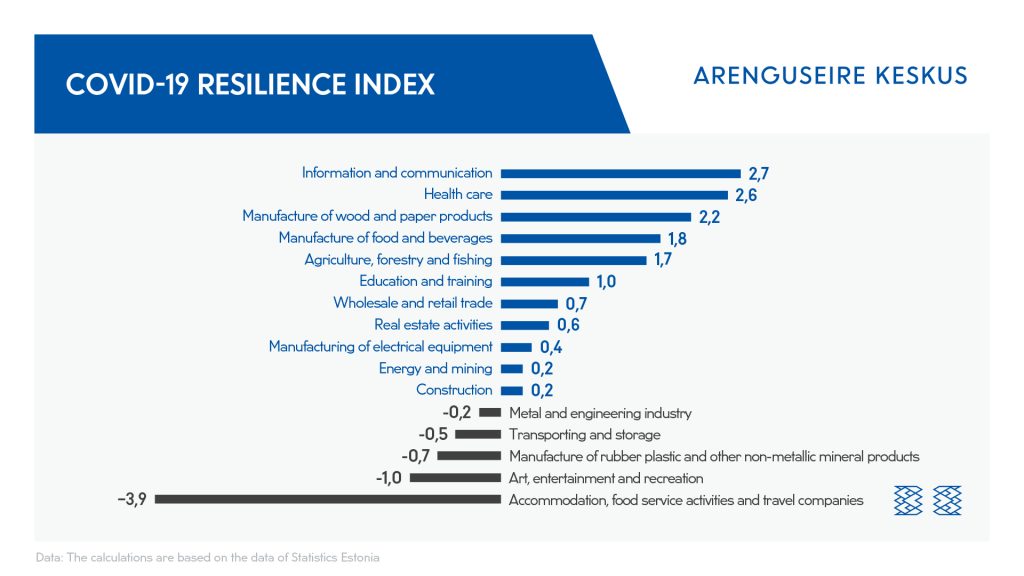Corona pandemic could create a development opportunity for Estonia’s electronics industry
The corona pandemic sets in motion the shortening of supply chains in the electronics industry, which leads to some of the manufacturing activities returning to Europe from Asia, showed the Foresight Centre report “The Impact of the Virus Crisis on the Estonian Economy. Scenarios up to 2030”, soon to be published. Estonia can benefit from investments only by offering a stable economic environment for investors.

“Estonian electronics and electrical appliance manufacturers export a huge part of their production, and the negative effect of the crisis has mostly taken the form of supply difficulties of production inputs or has problems with finding labour,” explained the Foresight Centre expert Uku Varblane. “The future prospects of the sector are favourable, because international trends, such as industrial digitalisation or Industry 4.0, internet of things, and environmental sustainability efforts are increasing the demand for electronics.”
The pandemic interfered with the supply of components for the electronics industry because plants were closed in Asia as well as Europe. “To ensure supply security, manufacturing is increasingly being brought closer to the final markets, relocating some of it from Asia to Europe. Estonia must work out how to take advantage of these favourable developments,” Varblane said.
Varblane added that companies with foreign capital form the core of the Estonian electronics industry and account for more than 90% of the turnover and export of the sector. “International concerns are very pragmatic in relocating their activities – Estonia must demonstrate a clear advantage to generate and keep up the investments. The search is for a stable and predictable economic environment with the right labour force,” Varblane explained. “We could highlight smart industry and its perspectives much more than before in shaping Estonia’s image.”
Varblane sees the Estonian electronics and electrical devices industry facing the second wave of the corona pandemic from a rather good standing point. “Factors that contribute to uncertainty regarding the pandemic include restricted movement between countries, trade wars, and more long-term aspects of the green transition – both carbon taxes and restrictions linked to environmental protection,” Varblane added. “On the other hand, the efforts of the green transition and the novel sustainable technologies mean increased demand for the products of the electronics industry.”
Electronics and electrical devices industry employed 2.3% of the labour force, or 12,700 people, in 2019; the importance of the sector in the added value of the Estonian economy was 1.5%, or EUR 382 million. Electronics and electrical devices form over 8% of Estonia’s export.
The monthly turnover of the businesses in the sector dropped in May and April this year by up to 24% compared to the year before but bounced back to the level of the previous year in June.
According to the COVID-19 resilience index developed by the Foresight Centre, the electronics and electrical devices industry ranks third (0.35 points) among the 17 economic sectors.
COVID-19 resilience index
The COVID-19 resilience index measures the extent to which economic sectors are affected by the coronavirus crisis. The index is based on various economic indicators of companies. The value of the index is between -5 (the largest negative impact) and +5 (the smallest negative impact). The index takes into account the changes in the turnover of companies (total turnover in March–August 2020 compared with the same period the year before) in the economic sector, changes in their number of employees in comparison to 2019 and the dynamics after the emergency situation, changes in labour expenses, and changes in the profit and investments of companies in comparison to the same period last year.

BACKGROUND
- The Foresight Centre started publishing surveys of the impact of the virus crisis on economic sectors on 17 November. On 30 November, the Centre will publish a short summary of energy.
- The calculations and figures of the surveys use the data of Statistics Estonia. The descriptions of development perspectives are based on interviews with representatives of sectoral associations and the focus group interviews conducted in cooperation with the research group of the Estonian Qualifications Authority OSKA. The Foresight Centre will present the scenarios for exiting the virus crisis at the beginning of December. Read more: https://arenguseire.ee/en/uurimissuunad/impact-of-covid-19/
- The impact of COVID-19 on the changes in the employment and skills in hospitality, catering and travel industry is described in OSKA’s special survey, which will be published in early 2021.
The Foresight Centre is a think tank at the Chancellery of the Riigikogu that analyses long-term developments in society and economy. The Centre conducts research projects to analyse the long-term developments in Estonian society and to identify new trends and development directions.
Latest news
-
16.01 2026Study: The transition to Estonian-language-based education has led Russian families to use the help of private tutors
Hiring private tutors is widespread in Estonia. According to the study by the Foresight Centre, “The Use of Private Tutors in Estonia”, the need for private tutoring is greatest in Russian-speaking families, where private tutors are hired more than twice as often as in Estonian-speaking families.

 An independent think tank at the Riigikogu
An independent think tank at the Riigikogu 